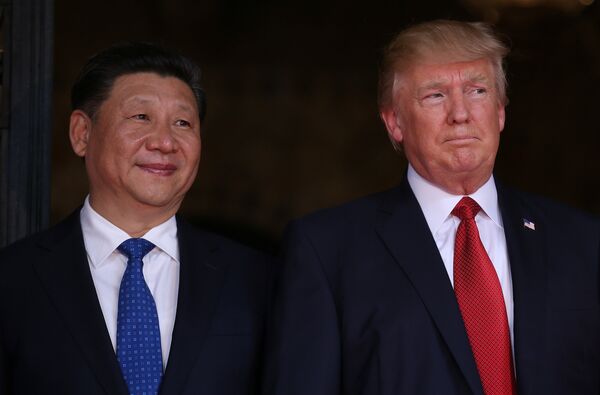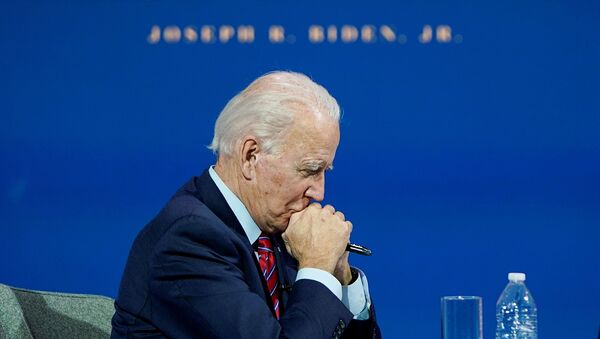On 25 November, Chinese President Xi Jinping joined the chorus of those world leaders who congratulated ex-Vice President Joe Biden, who is projected by the US media to win the race, amid the election controversy over alleged voter fraud. Chinese Vice President Wang Qishan saluted Biden's running mate Kamala Harris the same day.
What's Behind Beijing's Signals to Biden
The US mainstream media called Biden the winner on 7 November, prompting a wave of congratulatory messages from Washington's allies and partners despite the fact Donald Trump had refused to concede. Beijing hesitated for almost a week, but on 13 November offered congratulations to the Democratic nominee via a Chinese Foreign Ministry spokesman without naming Xi Jinping. Twelve days later the Chinese President finally tipped his hat.
The People's Republic's 13 November move was prompted by Mike Pompeo's Taiwan remarks, voiced a day before, suggests Thomas Weir Pauken II, a Beijing-based US commentator specialising in Asia-Pacific Affairs and author of "US vs. China: From Trade War to Reciprocal Deal".
"Chinese President Xi Jinping and the State Council had initially planned to wait for legal issues to get resolved before officially congratulating Biden as President-elect," Pauken believes. "Biden’s alleged victory looked highly suspicious so it served no advantage for China to rush in and congratulate him. But US Secretary of State Michael Pompeo gave a radio interview to Hugh Hewitt and said, 'Taiwan is not a part of China'."
The same day when Pompeo openly challenged Beijing's "One China policy" principle under which Taiwan is regarded as a sovereign territory of the People's Republic, Trump signed an executive order forbidding US companies and investors from conducting deals with Chinese companies linked to the People’s Liberation Army.
"Beijing officials were shocked," the China-based political commentator says. "China was one of the few sovereign nations delaying its congratulations to Biden, hoping they could score a 'win-win' US-China free trade agreement, should Trump’s legal team score victory and the US Supreme Court rule Trump can serve his second term in the White House. China played the waiting game to be careful. They understood Biden would be soft on Beijing, so there was no need to flatter him. But when the Trump administration issued anti-China statements and actions, Beijing felt they had to congratulate Biden."

'Biden Will Have No Other Choice But Open Doors to China'
Meanwhile, US foreign policy observers suggest that Biden's China strategy – should he occupy the Oval Office in January 2021 – will not differ much from that of Donald Trump. "Not only did Biden… pledge to take even more 'aggressive trade enforcement actions against China'," writes Foreign Policy magazine, "but he also proposed to rewrite global procurement rules to accommodate his $400 billion 'buy American' plan for government purchases". "Biden is rebranding but not reinventing Trump's China policy," notes The Washington Post.
However, Pauken believes that given Joe Biden's long record of cooperation with China and his role in promoting the People's Republic to the World Trade Organisation (WTO), it's more likely that the Sino-American relationship will undergo a reset under the potential Biden administration.
"Look to see Biden scrapping US-China trade wars," he says. "Biden is not likely to raise tariffs on Chinese imports. But the US dollar has declined against the Chinese yuan in value. This signals the Chinese economic rebound is for real and the US economy is going downhill. After Biden enters the White House, he is expected to mandate strict social distancing measures to combat coronavirus, which will spark serious disruptions to the US economy."
Pauken explains that "Chinese manufacturers and exporters are not expecting to boost trade with the US, the EU and UK markets in the year ahead as they anticipate Western democracies will struggle under gloomy economic conditions."
However, under these conditions China is likely to step up investments in foreign markets, including the US market, according to the political commentator. He expects massive cash flows from the People's Republic to buy up US properties and acquire American companies.
"The Biden administration will have no choice but to allow Chinese companies and investors to sweep into the US market starting in spring next year in efforts to spark a US economic revival. Biden will have an open doors policy for China in order to prevent the US economy from collapsing," Pauken believes.

US, UK and Their Allies Unlikely to Decouple With China in the Post-Covid Era
At the same time, however, British hawks are looking forward to beefing up the UK's military presence in the Indo-Pacific and teaming up with the US in a bid to counter rising China. On 22 November, the influential British think tank Policy Exchange, which brought together the former cabinet members of Canada, the UK, the US, Australia, and other countries, called for a joint effort aimed at challenging the Beijing-led Belt and Road Initiative and for a new military buildup in the Indo-Pacific in a report titled "A Very British Tilt".
The commentator expresses doubts that the “British Tilt” policy could succeed as a united front against China: "It’s silly to assume that Biden and Trudeau will be leading wars against Beijing. And if they do - that will lead to a tragic ending for them."
"A better question to ask: Will Washington, Brussels, London, Ottawa and Canberra follow through on the 'British Tilt' policy? This appears to be the dog that’s all bark and no bite. Are we to believe that the US, UK, EU, Australia and Canada will risk World War III or to decouple economically with China?", Pauken says commenting on the British conservative thought leaders' plan.
Furthermore, Biden has already pushed back against UK Prime Minister Boris Johnson over the latter's Brexit deal with Brussels, he believes. In contrast, "the US-EU alliance under Biden will remain vibrant", Pauken notes. "Biden was favoured by the globalist elites’ crowd. He will do the bidding of Brussels and he’s not even trying to hide it."
As for China’s Belt & Road Initiative, Beijing should focus more attention on its partnerships with countries in the emerging markets and developing world, according to the author. Besides the Belt and Road project, China signed a historic Regional Comprehensive Economic Partnership (RCEP) this month, which was called one of the world's largest trade agreements.


